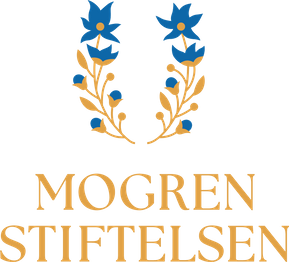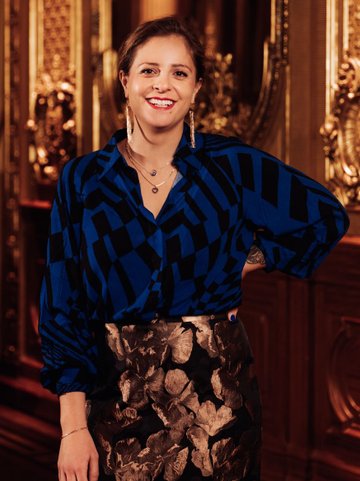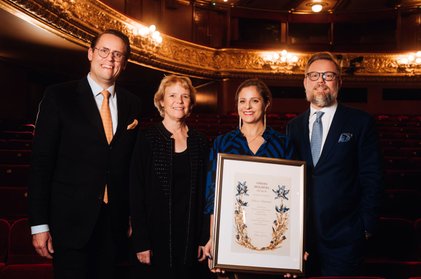2023 Music Prize
Helena Schuback sings to survive – now she is being celebrated
The 2023 Mogren Music Prize is awarded to opera singer Helena Schuback. Schuback was awarded the prize of SEK 250,000 for her impressive and brave career change from violinist to opera singer, with a voice tailored for a challenging new repertoire.
"A strong cultural life is so important, both for our well-being and for the unique spaces it creates for different thoughts and feelings to meet. Helena is an incredible example of the courage required of a musician. We are delighted that she, as a trained violinist, masters the song with such an impressive voice, says Professor Harriet Wallberg, former Chair of the Mogren Foundation."
“I think I have to sing to survive. Singing balances my psyche, enabling me to get through the day and to find desire and curiosity. And in turn, the psyche balances the voice when you are your own instrument."
Helena Schuback
Jury motivation
“Helena Schuback had the courage to leave her violin career to make her voice her main instrument. It is expanding without losing its beauty, and is increasingly suited to an exciting and challenging new repertoire. We want to see more."
What I’ve learned from living in a suitcase and “coraggio”
When she was a freshly graduated violinist, she decided to change courses – and chose one of the most difficult industries there is. The Swedish-Brazilian opera singer Helena Schuback’s guiding expression is “coraggio”, courage. Yet, she considers the audience’s courage more important than her own.
“I’ve thought a lot about the fact that I’ve never felt like I don’t have a home, despite living in a suitcase and going between Brazil and Sweden as a child. It didn’t matter where my body was; culture rooted me, and my ties to both Sweden and Brazil were very strong. Music, art, and literature made my world safe,” says Helena Schuback, the 2023 Mogren Music Prize awardee.
Helena and her younger sister have enjoyed a very international upbringing, with a Brazilian mother who was employed at the University in Rio de Janeiro, and a Swedish father, who was a freelance musician. Until age 12, she lived half-time in Brazil and used to fax her homework to Sweden once a week. And the family’s packing grew at the same pace as the violin-playing siblings.
“Being gone three months with children who are growing, the violins also need to size up at the same pace. Sometimes I travelled with like four violins, two cellos, textbooks, clothes, and teddies. I’m sure you can see…”
A dream of singing
Helena becoming a musician was a given for both her family and herself. She first studied at Lilla Akademien, a well-known music school in Stockholm, and later at The Royal College of Music in Sweden. When she later graduated, she hit a wall.
During a concert, Helena realised that she did not want to be a part of a symphony orchestra any longer. She had taken some singing lessons during high school to keep the dream about becoming a singer alive, but had not dared to fully take the step – until now.
That’s when Helena received an important nudge from her uncle, Lars, who was also in the music industry.
“A couple of days before he passed away, I met him in the street by coincidence. He said “Helena, shouldn’t you be singing instead?”. That was a dream I had not dared to follow.”
In the spring of 2018, at 28 years old, she was accepted into the Norwegian National Academy of Opera, just six months after she started singing again. This was in the eleventh hour for an industry where many programmes don’t accept students older than that.
Singing to survive
Putting a life as a violinist behind to walk a new path was both scary and challenging. Where does she get her strong motivation? Helena describes it as not having another choice than to sing.
“I think I have to sing to survive. Singing balances my psyche, enabling me to get through the day and to find desire and curiosity. And in turn, the psyche balances the voice when you are your own instrument.”
Helena compares it to doing balancing poses in yoga – being out of balance mentally makes it harder. You have to dare to let go of everything else to be present in the moment.
“I think that’s the guiding word: “coraggio”. Have the courage to let your voice be what it is. If you start thinking about your voice, it will stiffen. Singers like us have to work with our skills consciously, without thinking about every little thing we do. For the voice to grow as it wills, you need to give it space.”
Still, Helena considers courage to perhaps be more important for the people present in the room rather than the people on stage. Culture is a prerequisite for personal growth and society, for the ability to respect differences and building a world that feels safe:
"Attend cultural events. Be curious about something other than what you know well or agree with to enable growth not just as individuals, but also as a society!
Being removed from everyday life, hearing and becoming a part of something else, and then bringing it back out from the opera house affects people’s perspective, Helena believes.
"If only we could see each other more… I believe that’s the solution to all the big world problems. If we can truly see the man begging in the street, the actual individual, we open our hearts. Then our roots matter less, because humanity becomes our root system. We belong together."
About Helena Schuback
Helena Schuback, born in 1990, studied at the Lilla Akademin, the Oslo National Academy of the Arts, and the Opera Academy, and holds a master's degree as a violinist from the Royal College of Music in Stockholm.
After leaving her violin career to become an opera singer, she studied with Professors Paul Farrington and Toril Carlsen in Norway. Since January 2022, she has been coached by Sylvia Kevorkian and Sir Willard White.
Helena has performed roles such as Rosalinde (Die Fledermaus), Alcina in Handel's opera of the same name, Hébe, Phani, Zima, Fatime and Emilie (Les Indes Galantes) and L'amazzone corsara.



